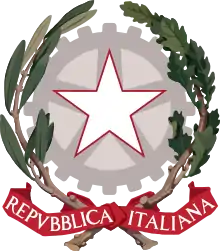Edo Ronchi
Edo Ronchi (born 31 May 1950) is an Italian engineer and politician. He served as minister of environment and protection of land and sea from 1996 to 2000 in three different cabinets. He was the first Green politician to hold a cabinet post in Italy.
Edo Ronchi | |
|---|---|
 | |
| Minister of Environment | |
| In office 17 May 1996 – 19 April 2000 | |
| Prime Minister | Romano Prodi Massimo D'Alema |
| Succeeded by | Willer Bordon |
| Member of the Senate | |
| In office 15 April 1994 – 29 May 2001 | |
| In office 28 April 2006 – 28 April 2008 | |
| Member of the Chamber of Deputies | |
| In office 12 July 1983 – 14 April 1994 | |
| Personal details | |
| Born | 31 May 1950 Treviglio |
| Nationality | Italian |
| Political party | AO (1968–1979) DP (1978–1989) VA (1989–1990) FdV (1990–2001) DS (2001–2007) PD (2007–2008) |
| Alma mater | Politecnico di Milano |
Early life and education
Ronchi was born in Treviglio on 31 May 1950.[1] He holds an electrical engineering degree from the Politecnico di Milano.[1]
Career and activities
Ronchi had a revolutionary communist political leaning.[2] Later he became a member of the Federation of the Greens.[3][4] He joined the party in 1983 and became a member of its steering committee in 1989.[1] He was elected to the Italian Parliament in 1983.[1] In 1989 he was elected to the European Parliament, but resigned from office after serving in the post just for one month to concentrate on his initiative, namely Rainbow Greens, which he had cofounded with Francesco Rutelli earlier in 1989.[1] In 1992 Ronchi became senator and was the leader of the Federation of the Greens in the Italian Senate.[1]
He was named minister of environment on 17 May 1996 to the cabinet headed by Prime Minister Romano Prodi.[3] Ronchi became the first member of the party who assumed a cabinet post in the country.[5][6]
After serving in the post in the first cabinet of Prime Minister Massimo D'Alema on 21 December 1999 Ronchi was reappointed minister of environment to the second cabinet of D'Alema.[7] His tenure ended on 19 April 2000 when the D'Alema cabinet resigned and Giuliano Amato formed the cabinet.[4][5] Ronchi was offered by Prime Minister Amato the post of minister of European affairs, but he did not accept the post due to his intention of serving as minister of environment.[4][8] However, Ronchi's proposal was not endorsed and Willer Bordon replaced him as minister of environment.[4][8] When Ronchi was in office as environment minister Italy signed the Kyoto Protocol in 1997.[6]
After leaving public office, Ronchi began to work at the Sustainable Development Foundation and is on the national advisory board of Ecomondo, an initiative for green movement.[9]
References
- Bernard A. Cook (2001). Europe Since 1945: An Encyclopedia. Vol. 2. Garland. p. 1084. ISBN 978-0-8153-4058-4. Retrieved 10 November 2013. – via Questia (subscription required)
- Roberto D'Alimonte; David Nelken (1997). Italian Politics: The Center-Left in Power. Boulder, Co: Westview Press. Retrieved 10 November 2013. – via Questia (subscription required)
- Piero Ignazi (1998). "Italy". European Journal of Political Research. 34 (3–4): 447–451. doi:10.1111/1475-6765.00054-i5.
- Alessandra Stanley (27 April 2000). "Italy's New Cabinet Bears a Striking Resemblance to the Old One". The New York Times. Retrieved 10 November 2013.
- Uday Desai (January 2002). Environmental Politics and Policy in Industrialized Countries. MIT Press. p. 216. ISBN 978-0-262-54137-4. Retrieved 10 November 2013.
- Miranda Schreurs; Elim Papadakis (14 August 2007). Historical Dictionary of the Green Movement. Scarecrow Press. p. 131. ISBN 978-0-8108-6434-4. Retrieved 10 November 2013.
- Mark Gilbert; Gianfranco Pasquino (January 2000). Italian Politics: The Faltering Transition. Berghahn Books. p. 269. ISBN 978-1-57181-840-9. Retrieved 10 November 2013.
- "Italian prime minister sworn in". BBC. 26 April 2000. Retrieved 10 November 2013.
- "Technical and scientific committee". Ecomondo. Archived from the original on 10 November 2013. Retrieved 10 November 2013.
